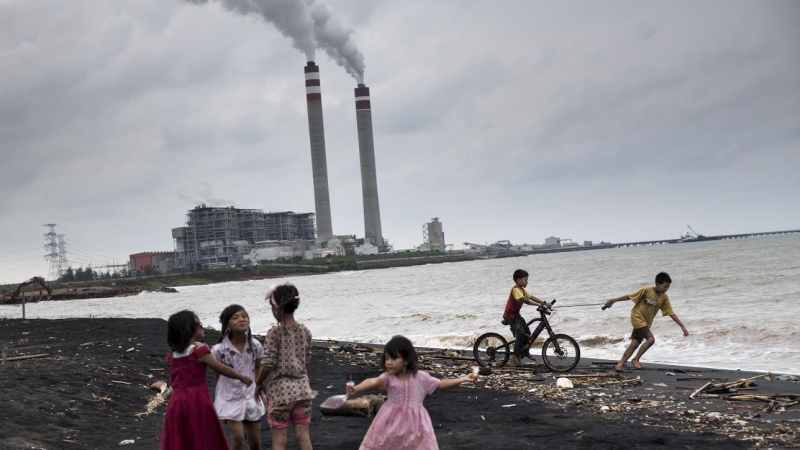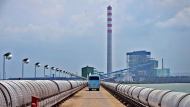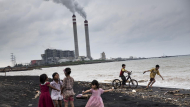COP22: The pressure is growing on banks financing coal expansion in Indonesia

As Dr Jim Kim, president of the World Bank, put it earlier this year, “we are finished” if the hundreds of new coal plants planned in Asia are built in the coming years. One of the Asian climate hotspots is Indonesia, where 100 coal plants are currently in planning. The COP22 meeting in Marrakech, Morocco concludes this week, and pressure is growing on banks – in particular Crédit Agricole, Société Générale and ING – to abstain from financing the first dodgy deals in the new Indonesian coal plant rush: the Tanjung Jati B 2 (TJB2) and Cirebon 2 dodgy deals.
Last gasp European bank coal plant financing?
In the coming weeks, the Japanese export credit agency, JBIC, and many commercial banks, including French banks Crédit Agricole and Société Générale and Dutch bank ING, along with top Japanese banks, will decide on whether or not to finance two coal power extension projects in Indonesia. Both projects are located on the main island of Java: TJB2 in Jepara, Central Java, and Cirebon 2 in West Java.
What is rather unusual here is that, under intense public pressure from civil society, all three of the European banks in the running have recently committed to terminate their financing of new coal power plants around the world. ING was the first to make such a commitment last year, a few days before COP21 in Paris. Crédit Agricole and Société Générale then did the same only last month in the run up to COP22 in Marrakech.
So why are the banks in question still involved in these deals? The response from the banks is that they consider themselves to have committed to financing these deals before they announced their new policies. And this despite the fact that neither of the two projects has reached ‘financial close’, the financial jargon describing the moment when all contracts are officially signed, and when plant construction gets properly under way.
A growing worldwide mobilisation
This is where international civil society steps to oppose the building of these damaging coal plants come in. Yesteday, at the Marrakech climate meeting, a press conference brought together campaigners from all over the world involved in these campaigns.
The main opposition to TJB2 and Cirebon 2 is coming from the local population, with assistance from Indonesian NGOs such as Greenpeace Indonesia and WALHI (Friends of the Earth Indonesia). Local communities have already suffered the impacts of the first Cirebon coal unit, due to its pollution, use of water resources and impacts on the natural environment. Respiratory infections have also increased in the area and fish and shrimp catches have dropped by more than half since unit one’s inception in 2007. Protests have thus been ongoing in Cirebon on a daily basis to oppose the construction of the second unit, which has been forecast to result in the death of 600 Indonesians every year.
Protests also took place last week in Jakarta, the Indonesian capital, in front of the Japanese embassy, with Japanese campaigners opposing JBIC’s practices – the Japanese export credit agency has already approved the highly controversial Batang project, and is now gearing up to support TJB2 and Cirebon 2.
On top of protests, representatives from impacted communities have also submitted a formal complaint against JBIC, demanding both the closure of the existing plant and the cancellation of JBIC's planned financing for the expansion plant at Cirebon. In the complaint they denounce the fact that these new power plants are being built first and foremost to serve the country’s industrialisation rather than the needs of poor communities which lack access to electricity.

This mobilisation against the two coal projects also spread to Europe earlier this year, with Friends of the Earth France targeting the two French banks Crédit Agricole and Société Générale for their involvement in the TJB2 project. Interventions at both banks’ AGMs in May, an action at the Eiffel Tower in July and a lot of exposure in the French media has cranked up the pressure on the banks – and contributed to their most recent pledges to end all financing for new coal plants around the world. However, these policy moves would appear to only apply in practice after the two Indonesian plants are taken care of.
The same situation applies at ING, the biggest bank in the Netherlands, which deems that, despite making its ‘no-coal’ commitment prior to COP21 last year, financing the Cirebon 2 project is in accordance with this commitment because negotiations on the deal started before their new policy came into place, even when financial close has not yet been reached yet. Dutch NGOs, including Oxfam NOVIB, Greenpeace Netherlands and others, are now denouncing ING for displaying the same climate hypocrisy as its French counterparts.

With only a few weeks or months to go before final financing decisions are taken on these projects, the pressure on would be financiers will only grow, with the climate reputations of Crédit Agricole, Société Générale and ING very much at stake. The demand to the banks in question, including the other Japanese banks involved, is straightforward: withdraw from TJB2 and Cirebon 2 immediately.


